Mélissa Maltais was born in Clermont, Charlevoix. Her father worked in a factory while her mother was an orderly. Mélissa was a calm student who showed interest and was very good at math and science. For seven years, following her older brother's example, she was a cadet and then a reservist in the Canadian Army, which allowed her to travel, challenge herself and learn a lot while in the forest. "One of my instructors worked in geodetics. He was an inspiration to me," she says.
Training in Québec
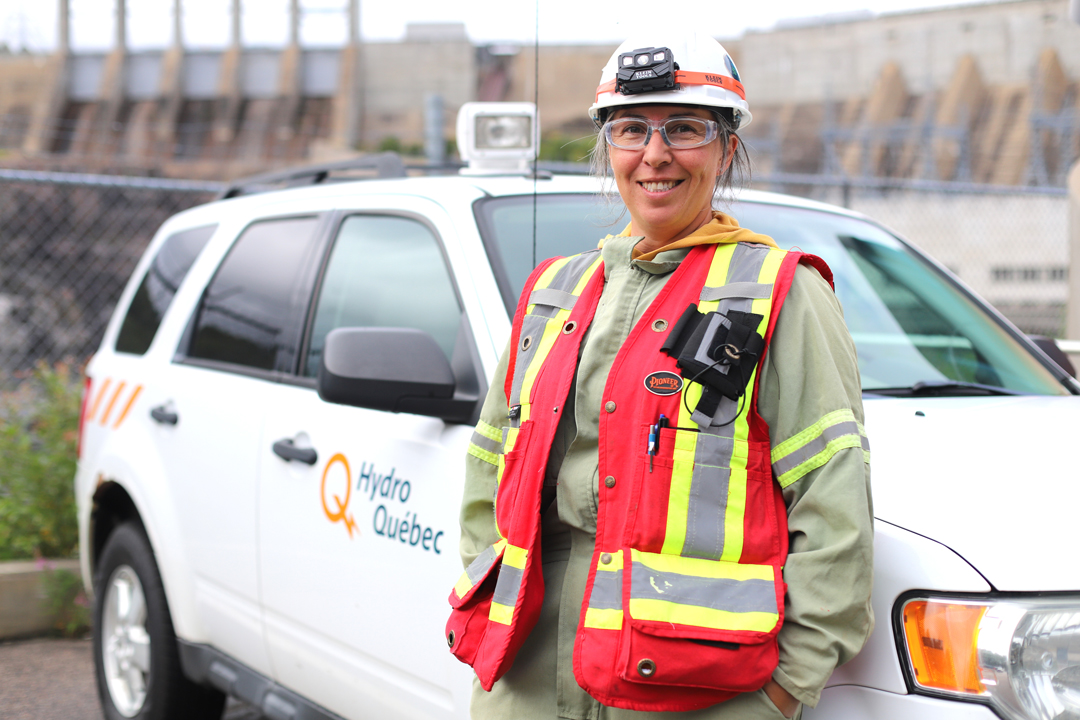 In cégep, Mélissa initially went into Pure and Applied Science, but she quickly realized that her manual nature and taste for fieldwork would be better suited to technical training.
In cégep, Mélissa initially went into Pure and Applied Science, but she quickly realized that her manual nature and taste for fieldwork would be better suited to technical training. In cégep, Mélissa initially went into Pure and Applied Science, intending to continue to military college or university, but she realized that her manual nature and taste for fieldwork would be better suited to technical training.
She enrolled at Cégep Limoilou in Geomatics Technology: Geodetic Surveying, a field where she excelled. "I loved my studies. The constant development of new technologies related to geomatics, the work on specialized software, everything was exciting. The courses were concrete and varied, and the other students and I shared similar profiles and common interests. I made friends for life!"
First Foray into the Job Market
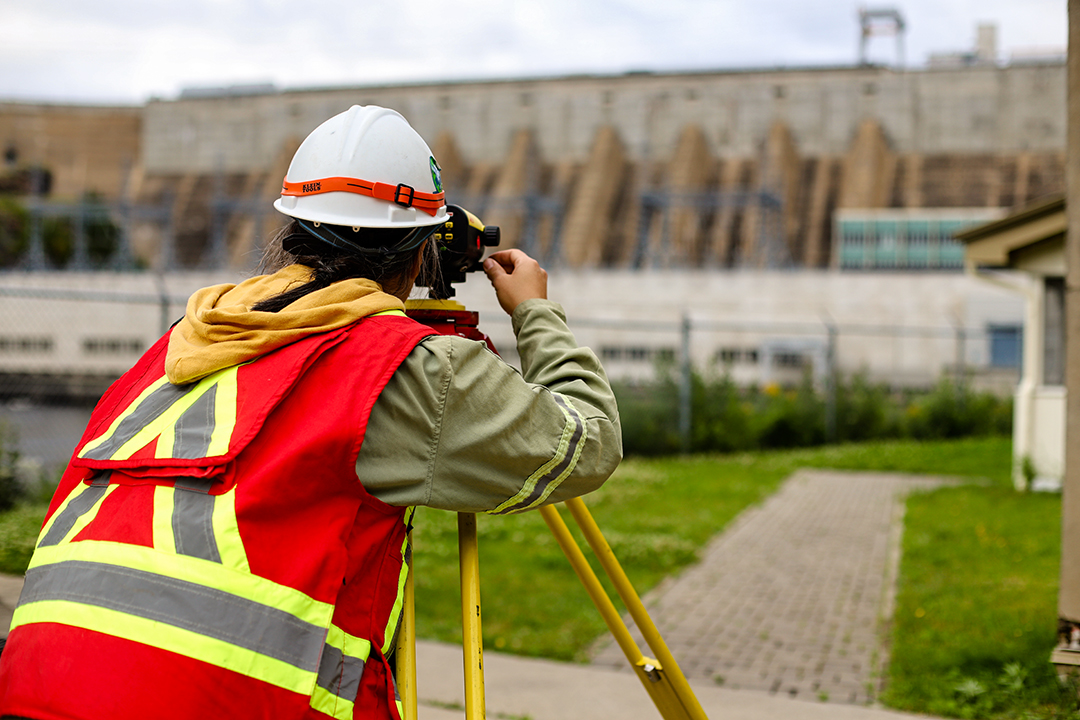 She chose Cégep Limoilou and the Geomatics Technology: Geodetic Surveying program.
She chose Cégep Limoilou and the Geomatics Technology: Geodetic Surveying program.At the turn of the year 2000, the job market offered few exciting opportunities for Mélissa, especially in her field of study. Despite a full-time job in a surveying firm, she struggled to make ends meet with the meager salary, so much so that after a year, the 20-year-old returned to school to study mechanical engineering, again at Cégep Limoilou. "I worked part-time in surveying while learning a new trade, which I liked very much, especially because I like 3D drawing." But, in 2003, the workload undermined her motivation to continue her studies.
Trade: Dam Inspector
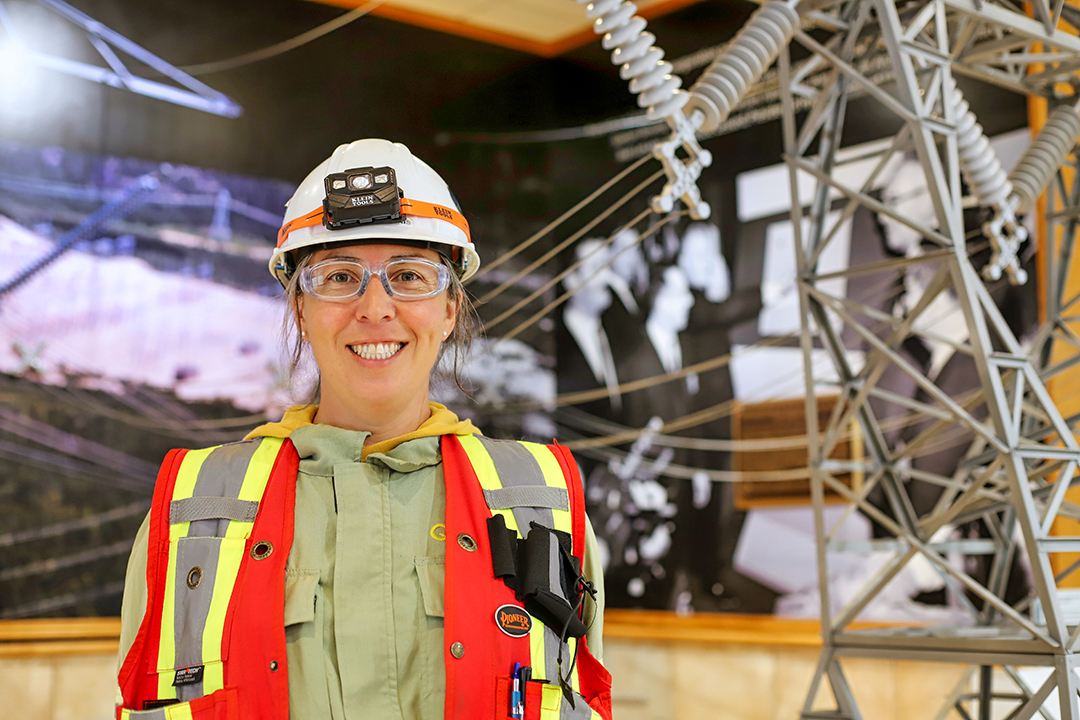 In 2005, while working for the geodesy department at her cégep, Hydro-Québec opened a position in dam inspection and monitoring, and surveying. She applied and got the job.
In 2005, while working for the geodesy department at her cégep, Hydro-Québec opened a position in dam inspection and monitoring, and surveying. She applied and got the job.Fortunately, luck was on Mélissa's side. She participated in a government competition and landed a job monitoring dams at the Centre d'expertise hydrique du Québec, an organization responsible for inventorying all the small dams in Québec, amongst other tasks. "This job took me on expeditions throughout the territory with a teammate to find and measure old, abandoned drive dams, often located in remote areas of the forest, which we searched for using ATVs or snowmobiles."
Lessons Learned from the Flood
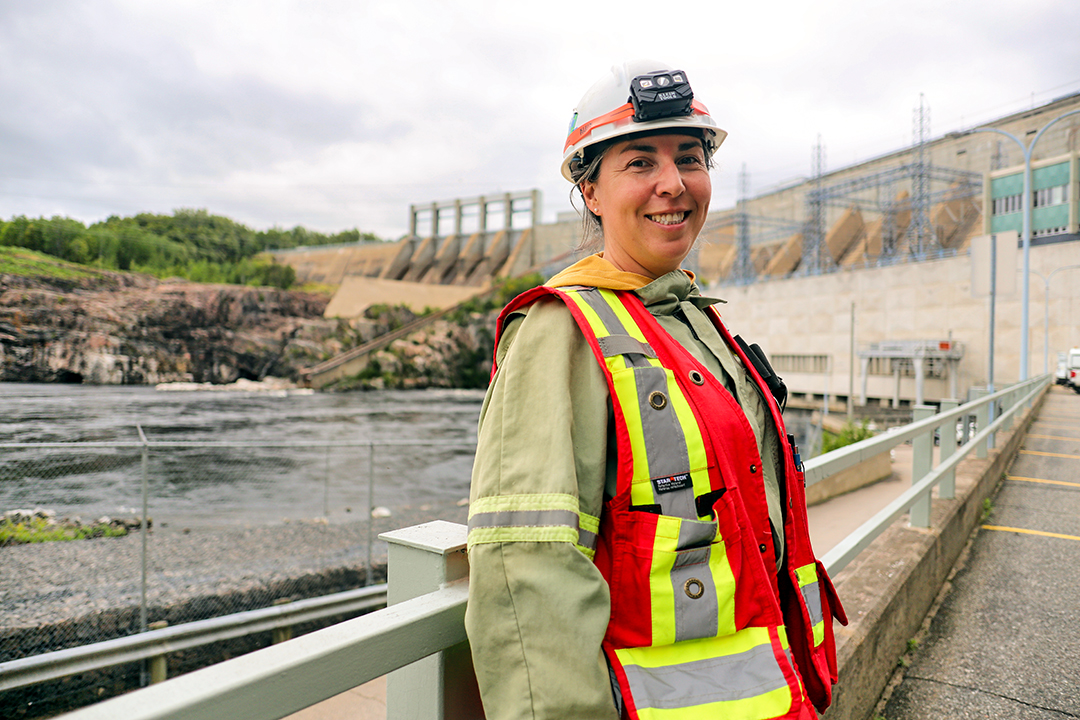 She moved to the Manicouagan region, where she flourished in the small village of Pointe-aux-Outardes.
She moved to the Manicouagan region, where she flourished in the small village of Pointe-aux-Outardes.This contract stems from the Dam Safety Act, which the Québec government implemented in the wake of the Commission scientifique et technique sur la gestion des barrages (Commission Nicolet) after the Saguenay flood in 1996, in order to protect people and property against the risks associated with these structures.
At this job, Mélissa developed her expertise in microgeodesy for topographic monitoring of structures and geotechnical monitoring, where the notions acquired in mechanical engineering are very useful.
Like her years on the reserve, she found herself in the minority as a female in a male-dominated field, but she fit in easily and felt welcomed.
A Career at Hydro-Québec
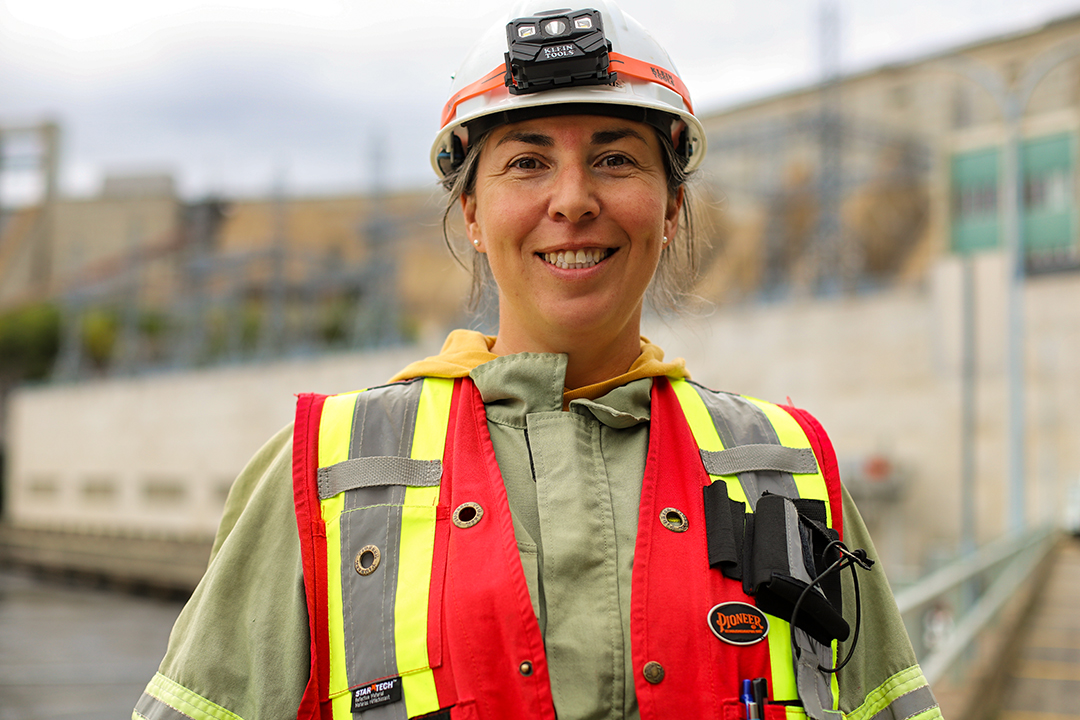 Since 2013, Mélissa has worked as an intermediate dam behavior monitoring technician.
Since 2013, Mélissa has worked as an intermediate dam behavior monitoring technician. Another opportunity presented itself to Mélissa in 2005 while she was working for the Geodesy Department at Cégep Limoilou: a position at Hydro-Québec that matched her expertise perfectly in dam inspection and monitoring and surveying. Encouraged by her colleagues, she took a chance, got the job, and started her career with the Montreal topographic surveying team.
As the Eastmain Dam began impoundment, Mélissa was tasked with measuring the dam's response to the rising reservoir with her colleagues. She was delighted. "I dreamed of working on large dams and have always been drawn to the great outdoors.
"The hydroelectric industry in Québec is one of our flagships, and it's exciting. It's magical to think that these facilities can respond to peak electricity consumption in just a few minutes."
Moving to the Manicouagan Region
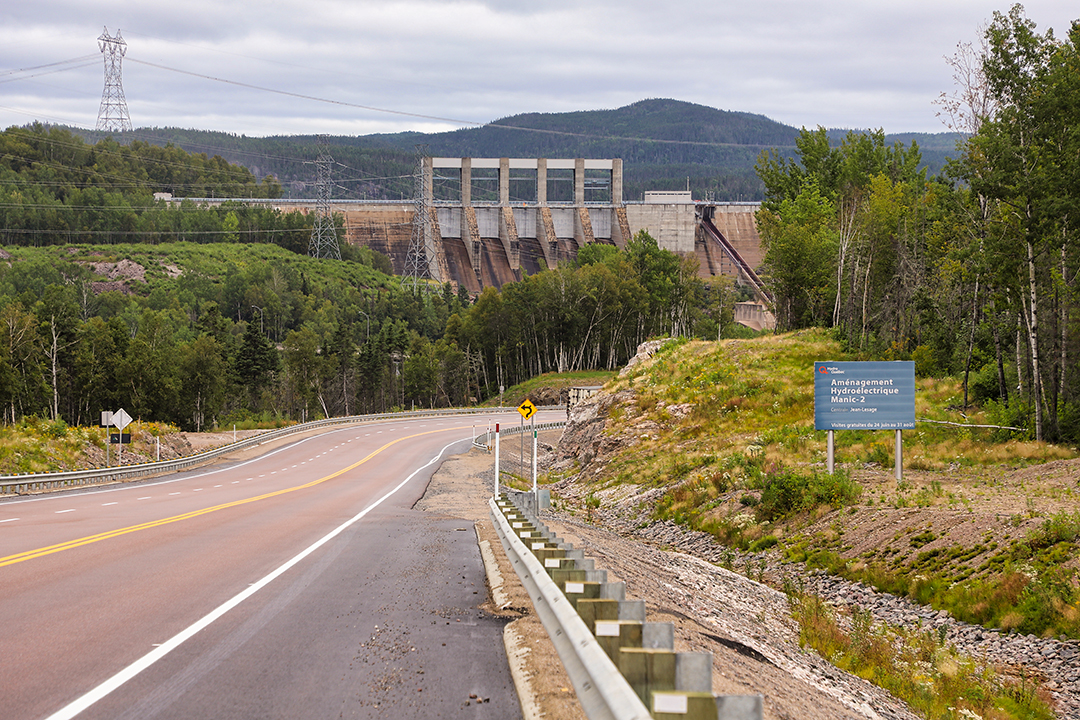 Civil engineering technicians produce detailed plans for infrastructure projects (roads, public utilities, etc.) and building structure projects.
Civil engineering technicians produce detailed plans for infrastructure projects (roads, public utilities, etc.) and building structure projects.In 2006, during a job centralization operation in the regions at Hydro-Québec, Mélissa moved to Côte-Nord. She was ready to live new experiences in an environment that always appealed to her. She settled in Pointe-aux-Outardes, a small village that juts out into the river and offers miles of beaches.
Her new environment offered an excellent quality of life. "I like to hunt and fish, so Côte-Nord was perfect for me!" While playing for her village's hockey-bottines team, she met her spouse, with whom she now has two children. When she is not at work, Mélissa cultivates a permaculture garden. She would like to develop it when she retires
Minority in a Man’s World
Since 2013, Mélissa has worked as an intermediate dam behavior monitoring technician. Her main task is validating data from field inspectors and automated instrumentation, primarily by graphing and analytically validating results to eliminate noise. "As a woman in a world that is still mostly male-dominated, I was obviously a little apprehensive, but I grew up in a male environment and spent my summers growing up in the woods in a ZEC with my dad and brother. I have always wanted to do my best to live up to the trust placed in me at work," she says.
"I learned that it is important to trust yourself, physical strength is not everything, and you shouldn't put up barriers for yourself. You have to be daring! This is even more true for a woman! To those who are thinking of studying in a male-dominated trade, I would say, believe in yourself and take your place!"
"My job is essential, and I take my role seriously. Hydro-Québec is a great company. To paint a picture, I often say it's like working in preventive medicine as I scrutinize the behaviour of dams. I also like the creative side of the job, as we strive to make graphs, plans, reports, and other visual aids that are clear, effective, and useful to engineers in their analyses."
Women at Hydro-Québec[1]
At Hydro-Québec, women hold 4.4% of all jobs in the "Trade" group (or 258, of which 26 are also Indigenous[2]), 10.6 % of the "Technologist" group (or 276, of which 3 are also Indigenous), 21.6 % of the "Engineer" group (or 489, of which 2 are also Indigenous) and 2.2 % of management (or 575, of which 5 are also Indigenous).
Various initiatives are in place in the company to encourage and support women in male-dominated environments. These include: participation in the Femmes inspirantes (Inspirational Women) project led by Anik St-Pierre, funded by the Secrétariat à la condition féminine (SCF), which aims to introduce girls to non-traditional occupations as soon as elementary school; a project entrusted to Geneviève Godbout aiming to attract potential cable workers and line workers from diverse backgrounds through fieldwork and partnerships; collaboration with the organization Action travail des femmes (ATF) to promote jobs; Inclusion Week with a day dedicated to women; consultations, workshops, and conferences.
Profession: Civil Engineering Technician
Civil engineering technicians produce detailed plans for infrastructure projects (roads, public utilities, etc.) and building structure projects. They conduct field investigations (land surveying, soil testing, contamination indicators, etc.) and prepare tenders and construction specifications.
Consult other videos related to the trade and training under the Useful links and videos tab on the Civil Engineering Technology program page.
As part of their duties, they coordinate construction projects to ensure conformity with plans and specifications. This job requires problem-solving skills, good observation skills, resourcefulness, and attention to detail. It requires an aptitude for science and drawing and is for individuals who enjoy teamwork.
[1]. Most recent data (July 31, 2022) provided by Hydro-Québec.
[2]. Data relating to Indigenous identification is based on voluntary self-identification.
